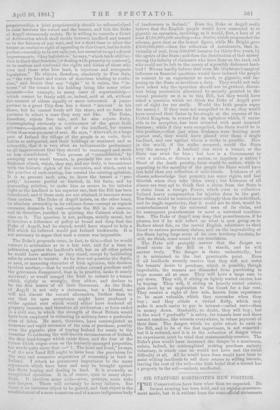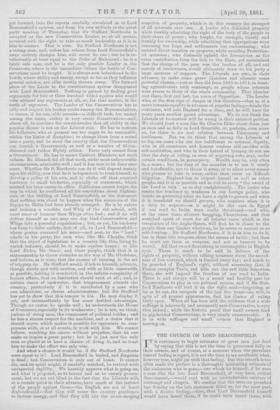SIR STAFFORD NORTHCOTE'S NEW POSITION.
THE Conservatives have been wiser than we expected. No formal meeting has been held, and no regular announce- ment made, hat it is evident from the semi-official statements put forward, from the reports carefully circulated as to Lord Beaconsfield's opinion, and from his own attitude at the great party meeting of Thursday, that Sir Stafford Northeote is accepted as the new Conservative Leader, or, at all events, invested with the right to take as much leadership as it is in him to assume. That is wise. Sir Stafford Northcote is not a strong man, and, unless his release from Lord Beaconsfield's sway entirely changes him, will never be one ; but he is in- tellectually at least equal to the Duke of Richmond ; he is a fairly safe man, and he is the only possible Leader in the Commons, where in the immediate future the battle of Con- servatism must be fought. It is always won beforehand in the Lords, where ability and energy, except BO far as they influence . general opinion, are alike mostly thrown away. The forward place of the Lords in the constitutional system disappeared with Lord Beaconsfield. Nothing is gained by finding good arguments for two or three hundred titled squires who would vote without any arguments at all, or, for that matter, in the teeth of argument. The Leader of the Conservatives has to rally and inapirit his broken ranks among the Representatives, to secure, if he can, able recruits—a difficult task, for, except among the caste, ability is very rarely Conservative—and, above all, to convince the constituencies that all ability in the popular House is not on the Liberal side, He has to restrain his followers, who at present are too angry to be reasonable, within the limits of discipline ; to change them from a crowd into a party, cud to show the country that the Conservatives can furnish a Government, as well as a number of ill-con- ditioned and rather flighty critics. Peers only cannot form a Government. He has to secure Cabinet Ministers, not acrid talkers. Mr. Disraeli did all that work, under most unfavourable circumstances, admirably well ; and it has now to be done once more. Whether Sir S. Northcote can do it will depend mainly upon his ability, now that he is independent, to trust himself, to develop a policy of his own, and to shake off that acquired tendency to small trickeries, especially of statement, which marked his later career in office. Politicians cannot forget the way in whieh ho swallowed all his convictions about Afghani- stan at the bidding of Lord Beaconsfield, or his Statement that nothing was about to happen when the summons of the Sepoys to Malta had been already arranged. He is by nature and training a sensible, cool Whig of the old school, with more sense of humour than Whigs often had ; and if he will deliver himself as one, may one day bind Conservatives and Whigs into a powerful organisation ; but, as yet, his tendency has been to defer unduly, first of all, to Lord Beaconsfield— whose genius overawed his sense—and next, to the " hard" minds in his party, the men who, like Mr. Chatilin, think that the object of legislation in a country like this, living by varied industry, should be to make squires happy ; or like Lord Elcho, Mr. Gorst, and those people, think that it is statesmanship to throw obstacles in the way of Mr. Gladstone, and believe, as it were, that the essence of running is the art of tripping up, Sir Stafford would, if left to himself, advance, though slowly and with caution, and with as little innovation as possible, holding it wonderful, in the infinite complexity of human affairs, that an institution should exist at all ; and, in certain times of backwater, that temperament attracts the country, particularly if it is manifested by a man who can administer, or choose administrators; but Sir Stafford has yet to show that this temper is his. He may display it yet, and intermediately he has some decided advantages. Though no orator, he speaks well ; he understands the House of Commons, especially in its weaknesses ; he is not, we think, jealous of rising men, the commonest of political foibles ; and he has a sincere respect for the machine, and a desire that it should move, which makes it possible for opponents to com- promise with, or at all events, to work with him. We cannot believe, watchin,g his career without prejudice, that he can make or inspire a great party ; but be is just now the only man so placed as to have a chance of doing it, and to trust him to make the effort was only wise.
And what a chance it would be, if Sir Stafford Northeote were equal to it! Lord Beaconsfield is buried, and Jingoism is dead ; but Conservatism is only out of heart. It cannot die, and its spirit might, if carefully watched, be revived with unexpected rapidity. We heartily approve what is going on, and what is proposed, as to tenure and as to county govern- ment, but we ere not blind, to the fact that the Liberals will, at a certain point in their advance, have much of the instinct of the people against them—the English are not at heart drab-coloured—that they will rouse the country gentlemen to furious energy, and that they will stir the never-sleeping suspicion of property, which is in this country the strongest of all interests save one. A leader who defended property while frankly admitting the right of the body of the people to their share of power ; who fought, for example, clearly and frankly for ownership, while admitting that aggregations were becoming too huge and settlements too embarrassing ; who resisted direct taxation on property, while avoiding Protection- ist nonsense ; who distinctly upheld the. Income-tax as the extra contribution from the rich to the State, yet maintained that the charge of the poor was the burden of all, and not merely of landowners, would ultimately draw to his party a large measure of support. The Liberals are sure, in their advance, to make some grave blunders and alienate some powerful classes,—just as they did from 1846 to 1874, in treat- ing agriculturists with contempt, as people whose interests were averse to those of the whole community. That blunder cost them, first and last, ten years of Opposition. The Leader who, at the first sign of danger in this direction—that is, of a move towards equality in advance of popular feeling—heads the resistance, will rule England for a time, and he will have for many years another grand advantage. We clo not think the Liberals of to-morrow will be wrong in their external politics. We should trust a man like Sir Charles Dilke about them just as soon and as fully as Lord Granville, or, perhaps, even more so, for there is no real relation between Democracy and feebleness. But we do think that among the Liberals of to-day are some who are too indifferent to external dignity, who in all conscience and honour confuse self-sacrifice with self-mutilation, and who in their hatred of tyranny do not see that the duty of ruling, or even of acquiring rule, may, under certain conditions, be peremptory. Wealth maybe, very often is, a snare ; but the duty of the moralist is to use it wisely and beneficially, not to throw it away, or to allow every scamp who pleases to take it away, rather than enter on difficult litigation. England has to respect herself as well as other people, and it is as possible and as evil to carry " the sword of the Lord in vain " as to slay unrighteously. The leader who resists the tendency to weakness in our foreign policy, who insists on governing when we have a right to govern and when it is beneficial we should govern, who acquires when it is a duty to acquire—as it might be the ease in Egypt if our road to India were really threatened—and who, at the same time, silences bragging, Chauvinism, and that wretched spirit of scorn for all inferior races which is the temptation of the Anglo-Saxon, will find he is closer to the people than any Quaker whatever, be he never so earnest or so self-denying. Sir Stafford Northcote, if it is in him to do it, has in those two weapons alone the means of battle ; but then he must use them as weapons, and not as banners to be waved. All that sword-flourishing is contemptible in English eyes. There is much to be said in defence of the rights of property, without talking nonsense about the sacred- ness of free contract, which is limited every day; and much to be guarded of England's right, without screaming that, if France occupies Tunis, and kills out the evil little despotism there, she will imperil the freedom of our road to India. There is and always will be a sound and healthy part for Conservatism to play in our political system, and if Sir Staf- ford Northcote will lead it on the right road—forgetting, as far as he can, the escapade of the last five years—he will, in spite of all present appearances, find his chance of ruling fairly open. When all has been said, the evidence that a wide suffrage is inherently and necessarily anti-Conservative, is very thin indeed ; while the historic proof that small owners tend to pig-headed Conservatism, is very nearly unanswerable. It is to wide suffrages and small owners that England is moving on.



































 Previous page
Previous page